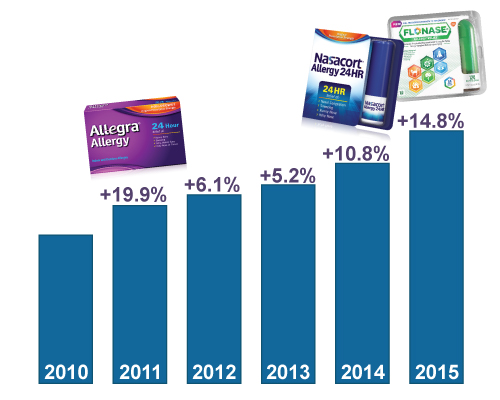The U.S. OTC allergy relief market has seen a period of rapid growth over the past five years, and 2015 was no exception. GlaxoSmithKline’s Rx-to-OTC switch brand Flonase Allergy Relief entered the market in February 2015 and made a huge impact on the OTC market by adding previous prescription users to the category. The OTC allergy market has seen a steady influx of Rx-to-OTC switch brands, which has resulted in rather high growth for this market over a fairly sustained period of time. In fact, the allergy category has grown by a compound annual growth of over 11% from 2010-2015, finds the latest edition of our Nonprescription Drugs USA report. This healthy increase is well above the typical growth for the overall OTC market, which grows about 2% to 3% per year on average.
Sales of U.S. OTC Allergy Market, 2010 to 2015

Flonase Allergy Relief brings strong brand equity from its prescription heritage, widespread consumer awareness, and improved efficacy compared to the existing OTC allergy brand. This leads to the brand reaping factory sales of over $200 million in just 10 months since entering the market.
Flonase Allergy Relief was not the only allergy brand that fared well last year. Zyrtec (Johnson & Johnson), Nasacort Allergy 24HR (Sanofi), Allegra (Sanofi), Claritin (Bayer Group), and Benadryl (Johnson & Johnson) all posted gains between 4% to 9% from 2014 to 2015, despite contending with a brand new and formidable competitor.
The increasing incidence of allergies combined with a fair amount of dissatisfaction among consumers means less brand loyalty in this category than most other OTC categories. That combined with very high levels of ad spending from major allergy brands helps drive solid gains. For a detailed assessment of the U.S. OTC allergy market, please refer to our soon-to-be-published 2016 edition of the Nonprescription Drugs USA. Future Rx-to-OTC switches that may enter the market and have significant impacts are also analyzed and forecast in detail in our Rx-to-OTC Switch Pipelines: Competitive Assessment.
Natural non-medicated allergy brands are also impacting sales of medication OTC allergy brands. To learn more about such brands, please consult our Natural OTCs: Impact of Non-drug Products on the U.S. OTC Market. Furthermore, the profitability of various allergy brands is assessed in the OTC Drugs: U.S. Competitor Cost Structures study.

